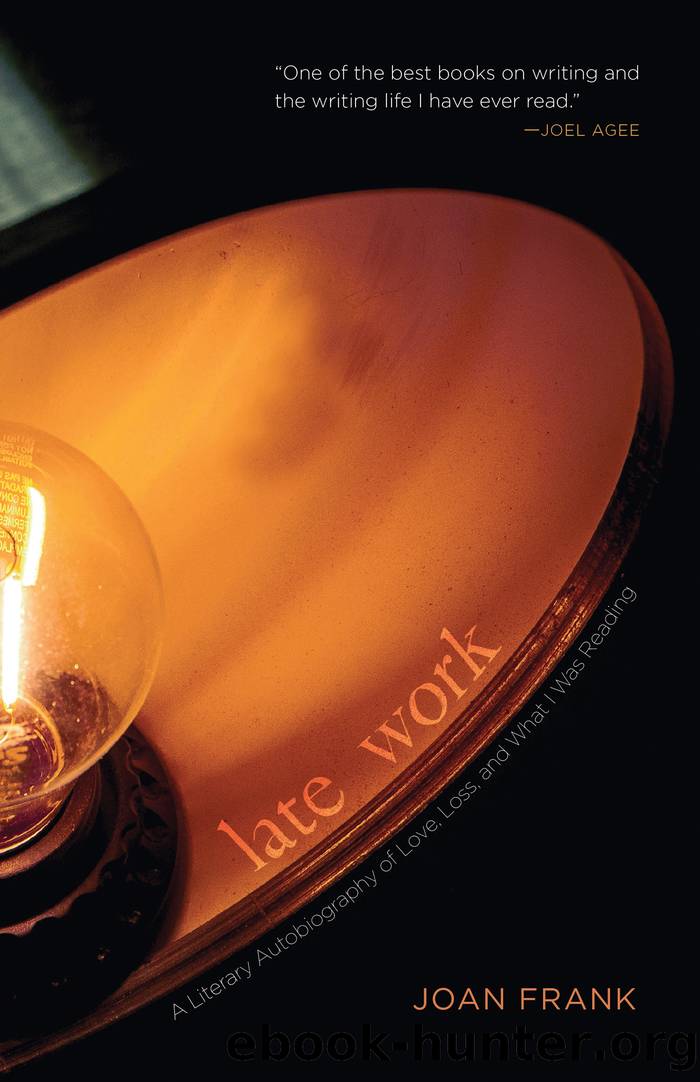Late Work by Joan Frank

Author:Joan Frank
Language: eng
Format: epub
Publisher: University of New Mexico Press
Published: 2022-06-15T00:00:00+00:00
Whatever You May Do
I had a brilliant uncleâthe late, distinguished professor Joseph Frank (not the Dostoevsky scholar), my fatherâs brotherâwhoâd secured a doctoral degree and was teaching college French by the age of nineteen. My dear dad, no slouch himself as a Columbia grad who also became a college teacher, claimed that Joe had forgotten more than he, my dad, would ever know. Joe spoke several languages fluently, had read everything, had traveled everywhere, and had served for a period in some diplomatic capacity to Eleanor Roosevelt. (A big glossy photo buried in my familyâs stashed boxes shows the two beaming together as he steadies before her a document she is signing.) I dimly recall, through conversations with now-dead family members, that Joe had later worked for Voice of America. Then, somehow, heâd been ejected from that heroic organization. A sympathetic friend later found him a position teaching at an elite, progressive prep school in Colorado. I visited Joe there when I was in high schoolâtoo young and self-immersed to have the wits or courage to ask him (or my father) about his past. Joe died in the middle of heart surgery shortly after my visit. He had summoned my father to be with him, sensing he would not make it. My father, bereft, wrote an impassioned encomium listing his beloved older brotherâs astounding achievements. âWild with grief,â my poor dad was. I, his clueless, self-immersed daughter, felt sad for himâconfused, intimidatedâand vaguely ashamed of the complexity and power of what I sensed I could not yet understand. I still canât imagine how Iâd have framed what I wanted to ask Joe. But Iâve never forgotten my dear dad one day repeating something Joe had told him privatelyâpresumably in anguish and despair:
Whatever you may doânever write down that which you do not wish the whole world to know.
Iâd already understood, wordlessly, that my handsome, wise, gentle, kind, lonely uncle, who perished at only fifty-three (though, alas, appearing far older) was gay. But in those days one never dared speak of that. Jobs, families, paychecks, reputations depended on silence and discretion. Yet it didnât require much imagination to connect the dots. I believe Joe was fired from Voice of America, or perhaps from a similar distinguished position, when someone intercepted a love letter from him to another man.
Having told that sad story: I still believe the letter form will always serve as a conduit for secrets. Thatâs its magnetism: the kernel of its lure. Each configurationâwhoâs writing whom, when, whereâstands for itself while comprising a larger pattern. Each carries its sets of conditions and risks, the variousness of personalities making choices inside those contexts. Each contains options for selective censorship, spin, camouflage, embellishment. But each also contains, as shown by my late uncleâs case, potential seeds of self-destruction. A writer selects tools for offering her secrets in letters just as she might in making fiction or essays: tone, diction, focus, selective payout. She will tend, I think, to be aware of the stakes.
Download
This site does not store any files on its server. We only index and link to content provided by other sites. Please contact the content providers to delete copyright contents if any and email us, we'll remove relevant links or contents immediately.
| Diaries & Journals | Essays |
| Letters | Speeches |
The Rules Do Not Apply by Ariel Levy(4946)
Bluets by Maggie Nelson(4541)
Too Much and Not the Mood by Durga Chew-Bose(4324)
Pre-Suasion: A Revolutionary Way to Influence and Persuade by Robert Cialdini(4205)
The Motorcycle Diaries by Ernesto Che Guevara(4078)
Walking by Henry David Thoreau(3948)
Schaum's Quick Guide to Writing Great Short Stories by Margaret Lucke(3368)
What If This Were Enough? by Heather Havrilesky(3302)
The Daily Stoic by Holiday Ryan & Hanselman Stephen(3292)
The Day I Stopped Drinking Milk by Sudha Murty(3184)
The Social Psychology of Inequality by Unknown(3011)
Why I Write by George Orwell(2942)
Letters From a Stoic by Seneca(2785)
A Short History of Nearly Everything by Bryson Bill(2679)
A Burst of Light by Audre Lorde(2586)
Insomniac City by Bill Hayes(2535)
Feel Free by Zadie Smith(2473)
Upstream by Mary Oliver(2382)
Miami by Joan Didion(2362)
